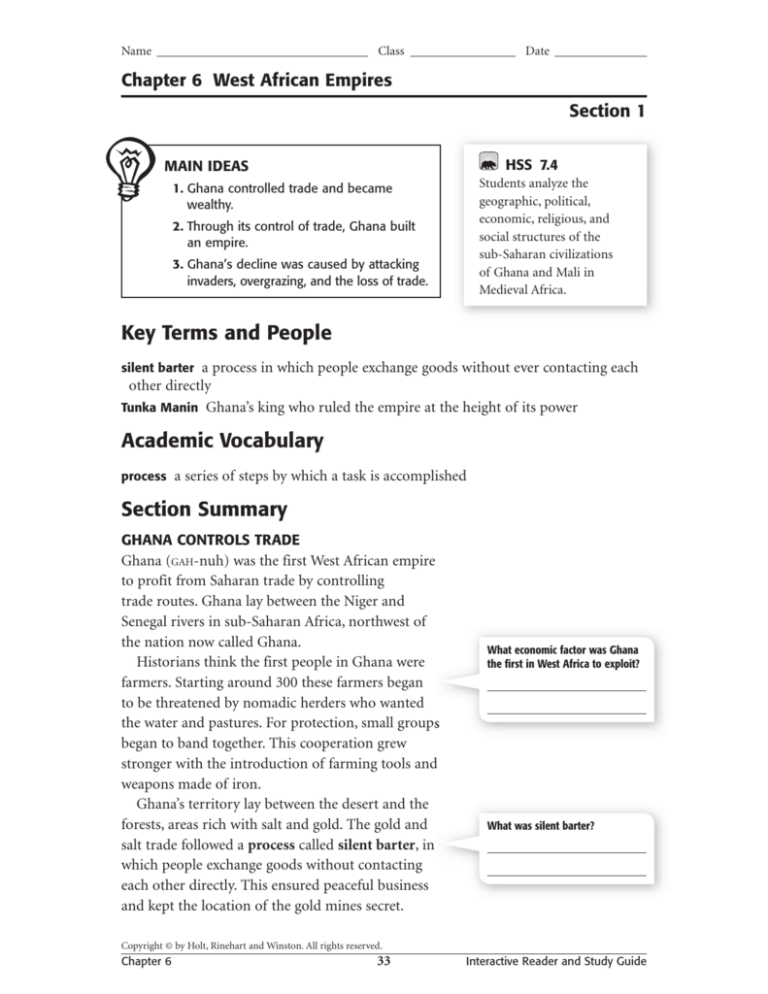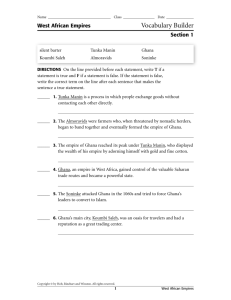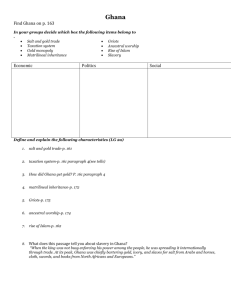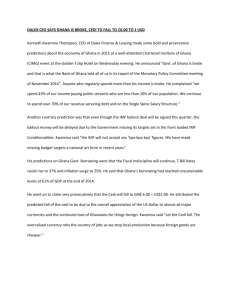
Name
Class
Date
Chapter 6 West African Empires
Section 1
HSS 7.4
MAIN IDEAS
Students analyze the
geographic, political,
economic, religious, and
social structures of the
sub-Saharan civilizations
of Ghana and Mali in
Medieval Africa.
1. Ghana controlled trade and became
wealthy.
2. Through its control of trade, Ghana built
an empire.
3. Ghana’s decline was caused by attacking
invaders, overgrazing, and the loss of trade.
Key Terms and People
a process in which people exchange goods without ever contacting each
other directly
Tunka Manin Ghana’s king who ruled the empire at the height of its power
silent barter
Academic Vocabulary
process
a series of steps by which a task is accomplished
Section Summary
GHANA CONTROLS TRADE
Ghana (GAH-nuh) was the first West African empire
to profit from Saharan trade by controlling
trade routes. Ghana lay between the Niger and
Senegal rivers in sub-Saharan Africa, northwest of
the nation now called Ghana.
Historians think the first people in Ghana were
farmers. Starting around 300 these farmers began
to be threatened by nomadic herders who wanted
the water and pastures. For protection, small groups
began to band together. This cooperation grew
stronger with the introduction of farming tools and
weapons made of iron.
Ghana’s territory lay between the desert and the
forests, areas rich with salt and gold. The gold and
salt trade followed a process called silent barter, in
which people exchange goods without contacting
each other directly. This ensured peaceful business
and kept the location of the gold mines secret.
What economic factor was Ghana
the first in West Africa to exploit?
What was silent barter?
Copyright © by Holt, Rinehart and Winston. All rights reserved.
Chapter 6
33
Interactive Reader and Study Guide
Name
Class
Date
Section 1, continued
The rulers of Ghana, strengthened by trade and
increased populations, took control of the trade
routes previously run by local tribes. A large trading
city, Koumbi Saleh (KOOM-bee SAHL-uh), became a
regular travelers’ stop.
GHANA BUILDS AN EMPIRE
By 800 Ghana was firmly in control of West Africa’s
trade routes. As a result, trade became safer and
Ghana’s influence increased. Traders were charged
a tax to enter or leave Ghana. The kings made it
illegal for anyone other than themselves to own
gold. They also taxed the people of Ghana.
The kings increased the size of Ghana by
conquering other tribes. However, Ghana’s kings
allowed local conquered rulers to retain much of
their own power. These kings acted as governors of
their territories. The empire of Ghana reached its
peak under Tunka Manin (TOOHN-kah MAH-nin).
GHANA’S DECLINE
By the end of the 1000s, Ghana had collapsed.
Three major factors contributed to its decline. A
group of Muslim Berbers called the Almoravids
invaded and weakened the empire. These Berbers
were herders, and their animals overgrazed and
ruined the farmland. Many farmers left. At the same
time, internal rebellions led to Ghana’s loss of
control over trade routes.
Write the name of Ghana’s great
trading city.
When the kings made it illegal
for anyone else to own gold, what
happened to the value of gold?
Explain.
List two reasons for the decline of
Ghana’s empire.
CHALLENGE ACTIVITY
Critical Thinking: Drawing Inferences Recreate the silent barter system
in the classroom. Divide students into groups of gold and salt traders.
Each group of “traders” should write a one-page paper detailing the
advantages and disadvantages of silent barter. HSS Analysis Skills
CS 3, HI 6
Copyright © by Holt, Rinehart and Winston. All rights reserved.
Chapter 6
34
Interactive Reader and Study Guide









